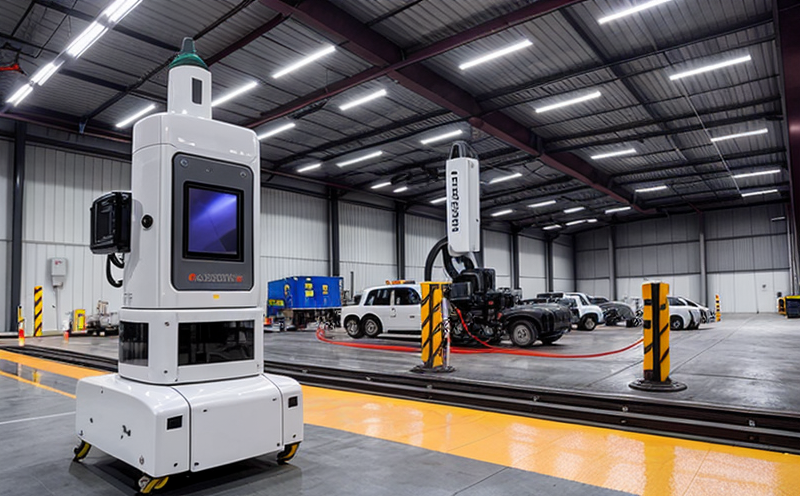Sensor performance validation for automated inspection robots
Unlocking the Full Potential of Automated Inspection Robots The Crucial Role of Sensor Performance Validation
In todays fast-paced industrial landscape, companies are increasingly turning to automated inspection robots to enhance quality control, increase efficiency, and reduce costs. These advanced machines rely on sophisticated sensors to accurately detect defects, anomalies, and other issues that can impact product quality and safety. However, ensuring the reliability and effectiveness of these sensors is a critical aspect of maintaining the integrity of the manufacturing process.
Thats where Sensor Performance Validation comes in a specialized laboratory service offered by Eurolab that empowers businesses to optimize their automated inspection robots and maximize their return on investment. In this comprehensive guide, well delve into the world of sensor validation, exploring its significance, benefits, and applications.
What is Sensor Performance Validation for Automated Inspection Robots?
Sensor performance validation involves testing and verifying the accuracy and reliability of sensors used in automated inspection robots. This process ensures that the sensors are functioning within predetermined specifications, providing accurate readings and minimizing false positives or negatives. By validating sensor performance, businesses can
Enhance product quality and safety
Reduce costs associated with rework, scrap, and warranty claims
Increase efficiency and productivity
Improve decision-making through data-driven insights
The Advantages of Sensor Performance Validation for Automated Inspection Robots
Sensor performance validation is a vital component of any automated inspection robots maintenance routine. Here are the key benefits
Improved Accuracy Regular sensor validation ensures that automated inspection robots produce reliable results, minimizing errors and rework.
Reduced Downtime Identifying and addressing sensor issues promptly reduces downtime and increases overall productivity.
Increased Efficiency By optimizing sensor performance, businesses can streamline processes, reduce waste, and improve resource allocation.
Enhanced Product Quality Sensor validation ensures that products meet quality standards, reducing the risk of defects and improving customer satisfaction.
Compliance with Industry Regulations Regular sensor validation helps companies maintain compliance with industry regulations and standards.
Additional Benefits
Sensor performance validation also offers several additional benefits, including
Extended Sensor Life By identifying potential issues early on, businesses can extend the lifespan of their sensors and reduce replacement costs.
Improved Data Analysis Accurate sensor data enables informed decision-making, allowing companies to optimize processes and improve overall performance.
Competitive Advantage Companies that prioritize sensor validation demonstrate a commitment to quality and innovation, setting them apart from competitors.
Frequently Asked Questions (FAQs)
Q What is the purpose of Sensor Performance Validation?
A The primary goal of Sensor Performance Validation is to ensure that sensors used in automated inspection robots are functioning accurately and reliably. This process verifies that sensor data is within predetermined specifications, minimizing errors and rework.
Q How often should I perform Sensor Performance Validation?
A The frequency of sensor validation depends on various factors, including the type of sensor, application, and operating conditions. Typically, sensors should be validated after installation, at regular intervals (e.g., every 6-12 months), and whenever changes are made to the inspection process.
Q What happens if I dont perform Sensor Performance Validation?
A Failure to validate sensor performance can lead to reduced product quality, increased costs, and compromised safety. Inadequate sensor validation may result in
False positives or negatives
Reduced accuracy and reliability
Increased rework and scrap rates
Compliance issues
Q Can I perform Sensor Performance Validation in-house?
A While some companies may choose to conduct sensor validation in-house, its essential to note that this process requires specialized expertise and equipment. In many cases, outsourcing sensor validation to a reputable laboratory like Eurolab ensures accuracy, efficiency, and cost-effectiveness.
Q How do I choose the right laboratory for Sensor Performance Validation?
A When selecting a laboratory for sensor validation, consider factors such as
Expertise in sensor validation
Experience with similar applications
State-of-the-art equipment and facilities
Compliance with industry regulations
Q What is the cost of Sensor Performance Validation?
A The cost of sensor validation varies depending on factors like the type and number of sensors, testing requirements, and laboratory fees. Eurolab offers customized pricing plans to suit individual business needs.
Conclusion
Sensor performance validation for automated inspection robots is a critical component of maintaining product quality, reducing costs, and optimizing efficiency. By understanding the benefits and importance of sensor validation, businesses can unlock the full potential of their automated inspection robots and achieve significant improvements in productivity and profitability.
At Eurolab, our team of experts is dedicated to providing high-quality Sensor Performance Validation services that meet the unique needs of each client. With a focus on accuracy, efficiency, and customer satisfaction, we empower businesses to make informed decisions and drive growth in an increasingly competitive landscape.
Dont compromise on product quality or safety. Trust Eurolab for your sensor performance validation needs and discover the difference that accurate sensor data can make in your operations.




